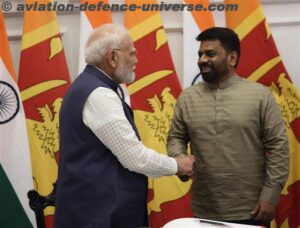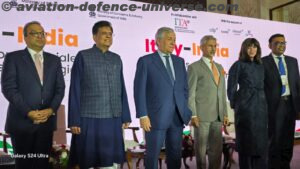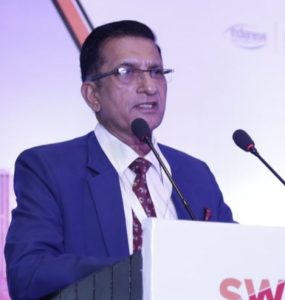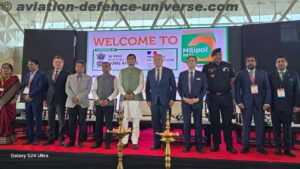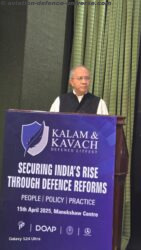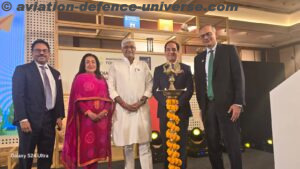By JK Verma
New Delhi. 19 April 2018. The grip of the dragon is escalating on the South Asian Association for Regional Cooperation (SAARC) countries. Pakistan which is completely indebted to China has already handed over Gwadar strategic seaport and China would build an offshore naval base close to Gwadar. There are also reports that China is eyeing on arable land of Pakistan as the former has more population and less arable land therefore it became the biggest importer of food items in the world.
Nepal which is the current head of SAARC is also toeing Chinese line, although Prime Minister K.P.Sharma Oli recently concluded three days visit to India but his leaning towards China is well known. Present Sri Lankan Prime Minister Ranil Wickremesinghe is considered close to India but the country had to handover strategic port of Hambantota to China on a 99 years lease. Not only this, trouble is brewing as thirteen MPs from allied Sri Lanka Freedom Party (SLFP) voted against Wickremesinghe’s United National Party. China has considerable clout on Bangladesh and Afghanistan while it is threatening Bhutan.
China has also enhanced its clout on Republic of Maldives and signed Free Trade Agreement (FTA) in September 2017 with Maldives archipelago.
The situation worsened in Maldives when Abdulla Yameen Abdul Gayoom President of the Maldives since 2013 and half-brother of former President Maumoon Abdul Gayoom disregarded Supreme Court ruling of February one, pertaining to releasing of nine opposition leaders including Mohamed Nasheed, first democratically elected president and founder member of Maldivian Democratic Party (MDP). He has closed parliament, arrested Chief Justice, overruled constitution and destroyed the rule of law.
Not only this, Yameen also promulgated emergency in the country and also sent emissaries to China, Pakistan and Saudi Arabia while diplomatically ignored India. China issued a caveat that no country should intervene in the internal matter of Maldives which was the clear warning to India although Mohamed Nasheed, opposition leader requested India and USA to interfere and stop all financial dealings.
China which has a long term interest in this area also took an island on lease from Maldives, for fifty years in 2016 on a paltry sum of USD 4 million. Maldives which is located just 700 KMs from mainland India also approved Chinese President Xi Jinping’s favorite project Belt and Road Initiative (BRI) although India refused to participate in it.
Yameen would endeavour to balance between India and China and would also strive to extract as much benefits as feasible from both the countries but it may not be easy. Besides international pressure there are protests in the country and the opposition parties are also demanding the release of prisoners and restoration of rule of law. Imposition of emergency has adversely affected the tourism industry of Maldives which is the backbone of its economy.
India and Maldives had close relations since its independence in 1966 as India was the first country to recognise the new-born nation. In November 1988 when armed Tamils were about to capture the country, India sent troops and circumvented their plans.
President Yameen who is supporting BRI amended the constitution in 2015 so that Chinese can buy land and China took advantage of it and bought unpopulated Feydhoo Finolhu Island. There are reports that soon China will purchase one more island. The distance between India’s Exclusive Economic Zone (EEZ) and Feydhoo Finolhu Island is only 75 nautical miles which is dangerous for India’s security. India should assess the situation carefully as China would like to weaken India’s sway not only on Maldives but in other neighbouring countries too. Chinese investment in Maldives would augment its authority in the Indian Ocean.
President Yameen is slowly curbing India’s investment and encouraging Chinese investments. In 2012 government cancelled agreement of Indian company GMR for building the international airport and the contract was awarded to a Chinese firm. Besides GMR, contracts of Tatva Global Renewable Energy and Tata Housing were also arbitrarily cancelled.
China which considers India as a potential competitor is enhancing its influence in the region and several times on the cost of India. However New Delhi has to be cautious as at present Maldives has leaned more towards China abandoning the policy of “India first”.
Nonetheless at present India’s options are limited, it cannot send troops as China has already warned. India is also not in a position to impose sanctions on Maldives as it will be counter-productive and would further enhance the influence of China. Stopping the export of essential items would create shortage of vital commodities and the public which is already anti-India will become more antagonistic. Kathmandu alleged in 2015 that India has put an unofficial blockade which created economic and humanitarian crisis in Nepal. It gave a bad name to India as economic sanctions further alienated the masses.
The first round of presidential elections is scheduled to be held in September 2018 and Yameen is worried about his descending popularity. Hence any blockade or military action by India would be Godsend help to him. In 2013 elections also Yameen won with slender majority hence the chances of his victory in forthcoming elections are remote.
His efforts to subvert forthcoming elections may not be feasible and China which has already declined to provide security to Chinese installations will also not render assistance in undermining the elections.
Maldives is thoroughly radicalised and became pronounced Sunni country and any move by India will be considered an onslaught on Islam. Pakistan, Organisation of Islamic Countries (OIC) and several other Muslim countries may speak venom against India and it will be beneficial for President Yameen as he can make it an important election issue.
According to reports about 200 Maldivian youths had gone to Syria and Iraq and joined Islamic State which is very high percentage as the population of the country is approximately 4 lakh 42 thousands only. It indicates that Islamic fundamentalism has increased manifold which is a dangerous trend.
Yameen wants to play Islamic as well as anti-India card in the coming elections hence New Delhi must be careful not to give that opportunity to him. Besides concluding free-trade agreement Yameen also accepted President Xi Jinping pet project BRI hence he will also get support from pro-China elements in the country.
Besides India, other countries especially United Nations, Japan, United States and European Union should also be watchful about the changed political situation in Maldives as the island is located in the Indian Ocean at a strategic place and China’s undue influence may be dangerous in future. There are reports that China intends to build artificial islands near Maldives as it constructed in the South China Sea, which will pose a danger to other countries.
Mohamed Nasheed and his party along with other political leaders must propagate that Yameen has killed the democracy and arrested politicians as well as judges and if he is elected again democracy will be doomed. The opposition leaders should also mention the expansionist designs of China by quoting takeover of Gwadar in Pakistan and Hambantota in Sri Lanka and also Feydhoo Finolhu Island in Maldives.
India is inculcating close relations with Japan, Vietnam and USA so that it can counter China in case of need. At present best option for India is to wait and see the result of forthcoming elections as according to reports Yameen lost public support and he will loose forthcoming elections.
The international observers also mention that Yameen has repeated the same blunder which was done by Sri Lankan President Rajapakse when he become too close to China and later lost the presidential election. Same way in 2015 when Myanmar made substantive political changes and moved towards democracy it terminated several Chinese projects. Hence India may watch the political developments closely and the outcome of forthcoming elections.
In fact India should forget the past events of 1962 and should not be motivated by Western tinkers to consider China as its adversary. Western think-tanks are aware that if both dragon and elephant join hands both countries will become super powers and Asia will override USA and Europe. US strategists are also aware that India is the only country in this region which can counter the fast escalating might of China.
It is encouraging that both Indian and Chinese policy planners are making sincere efforts to diffuse the tension. Foreign Secretary Vijay Gokhale who is China expert visited China in February and met Foreign Minister as well as State Councillor to disseminate the tension and finalized the calendar of exchange of visits which includes visits of Indian Defence Minister, Indian Foreign Minister and Prime Minister. It is visualised that these high level visits would mitigate the tension and the economic progress of both countries would continue unabated.
(Jai Kumar Verma is a Delhi-based strategic analyst and a retired senior intelligence officer. The views in the article are solely the author’s. He can be contacted at editor.adu@gmail.com)






































